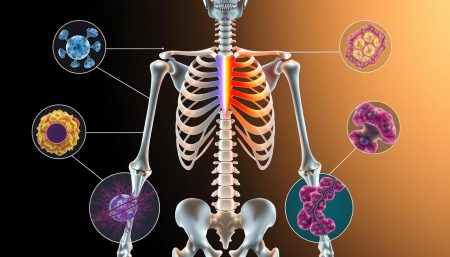When abnormal bone marrow is mentioned, many worry about cancer. But, is it always a sign of illness? Our knowledge of bone marrow has grown. Now, we see many conditions that can change its function and look.
The phrase “does abnormal bone marrow mean cancer” can be scary. This article wants to clear up the link between bone marrow changes and health. It’s a guide for those unsure about their health.
Changes in bone marrow might mean our body is fighting off something. It’s a time for kindness and knowledge to come together. It’s a chance for patients and doctors to talk and learn together.
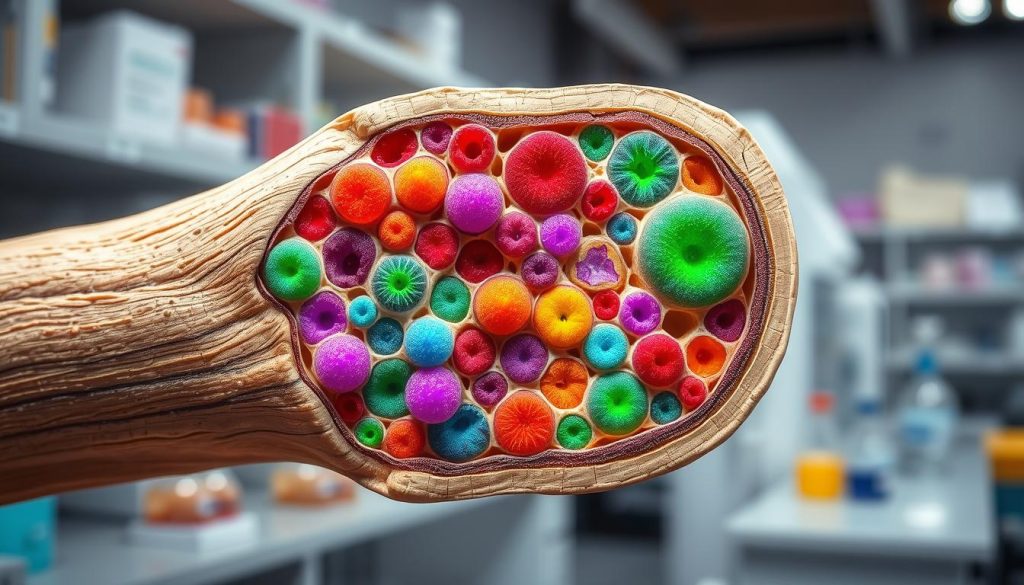
Let’s explore the world of bone marrow together. We’ll look at its beauty and the conditions that might upset it. This is the start of a story that shows life’s complexity and our bodies’ strength.
Key Takeaways
- An abnormality in bone marrow does not confirm cancer; it encourages further evaluation.
- Distinguishing between cancerous and non-cancerous bone marrow conditions is crucial for targeted healthcare.
- Multiple factors can contribute to changes in bone marrow, and understanding these is key to appropriate medical action.
- The journey to demystifying bone marrow abnormalities is steeped in empathy and the latest medical insights.
- Comprehensive knowledge equips patients and their families to navigate the complexities of bone marrow health.
Understanding Bone Marrow Abnormalities
Bone marrow is key to our health, making blood cells and more. It’s important to know what it does and how it works. This helps us understand bone marrow problems and cancer better.
What is Bone Marrow and Its Function
Bone marrow is like a factory for blood cells. It makes red, white, and platelets. These are crucial for carrying oxygen, fighting off infections, and stopping bleeding. Its role is vital for our immune system and healing.
Common Causes of Abnormal Bone Marrow
Many things can cause bone marrow problems. These include genetic issues and exposure to harmful substances. Knowing about these helps us understand cancer and other marrow issues.
- Infections that disrupt normal marrow function
- Autoimmune diseases that mistakenly target bone marrow cells
- Chemical exposure leading to toxic effects on marrow
- Age-related degeneration of bone marrow capacity
Not all bone marrow problems are cancer. Many are caused by other issues like vitamin deficiencies or benign growths.
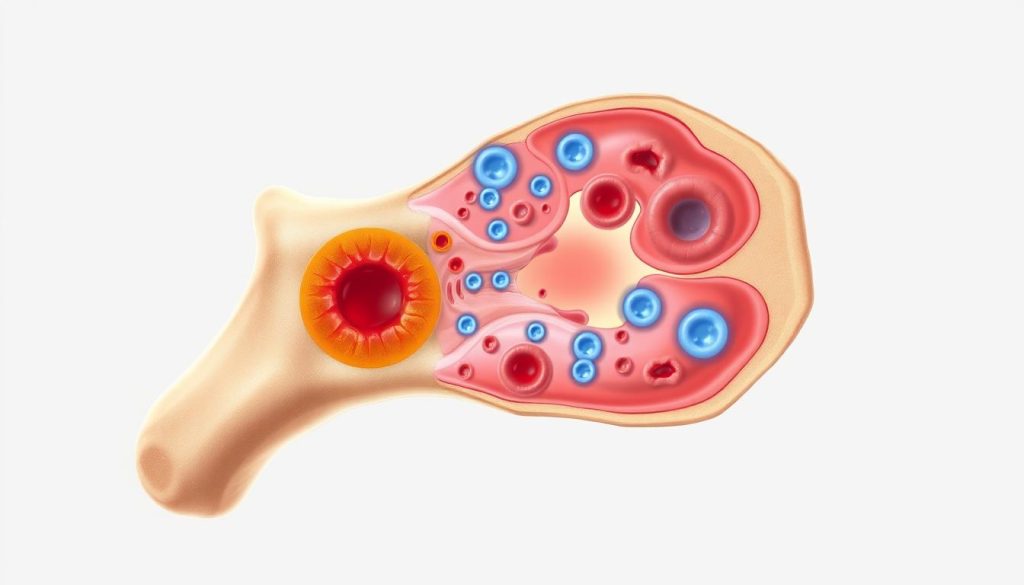
Learning about bone marrow problems helps us treat them better. This knowledge is important for patients and anyone interested in health and medicine.
| Condition | Impact on Bone Marrow | Potential for malignancy |
|---|---|---|
| Anemia | Decreased red blood cell production | Low |
| Leukemia | Overproduction of abnormal white blood cells | High |
| Myelodysplastic Syndromes | Poor quality blood cell production | Medium to High |
| Chemical Exposure | Toxic damage leading to marrow failure | Variable |
Understanding the difference between benign and malignant bone marrow issues is key. This helps us detect problems early and treat them effectively. It also helps prevent the problem from getting worse.
Indicators of Bone Marrow Health
Checking the health of bone marrow is key to spotting and understanding different conditions. This includes abnormal bone marrow and cancer diagnosis. Blood cell counts and bone marrow biopsies are two main tools used. They give important info about abnormal bone marrow cancer.

Evaluating Blood Cell Counts
One early step is looking at blood cell counts. This test shows the types and numbers of blood cells. It helps see how well the bone marrow works. Big changes from normal might show bone marrow cancer symptoms or other problems.
Understanding Bone Marrow Biopsy Results
A bone marrow biopsy is a more sure way to find abnormal bone marrow cancer. It takes a small piece of bone marrow tissue for a close look. Doctors can spot specific problems that blood tests might miss.
| Type of Test | Purpose | Indicative of Cancer? |
|---|---|---|
| Blood Cell Counts | Measures types and numbers of blood cells | Possibly |
| Bone Marrow Biopsy | Examines marrow tissue for cell abnormalities | Yes |
To learn more about bone marrow cancer, check out more on its types and how it’s managed. Knowing this helps catch it early and plan better treatments.
Does Abnormal Bone Marrow Mean Cancer
When patients get reports of abnormal bone marrow, they often wonder if it means cancer. This question highlights the complex link between bone marrow issues and cancer. It shows why getting a precise diagnosis and talking to an expert is key.
Abnormal bone marrow can point to different health problems, some of which are cancerous. But, not all issues are cancer. Problems like vitamin deficiencies, autoimmune diseases, and infections can also cause bone marrow to act strangely.
Looking deeper into the bone marrow cancer connection, we find that certain cancers like leukemia, lymphoma, and myeloma affect the bone marrow. These cancers change how the marrow works and how it makes cells. Tests can spot these changes.
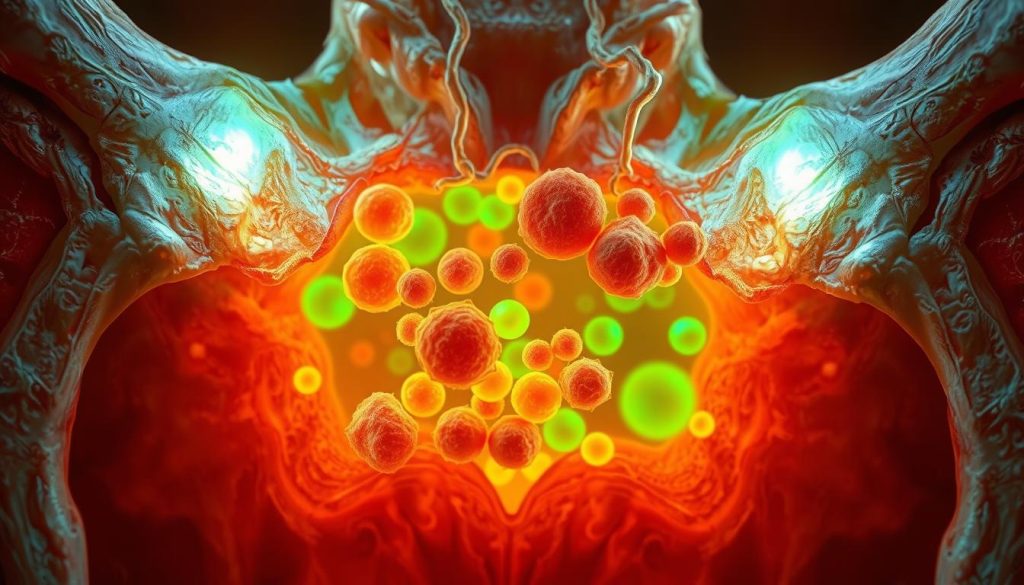
To figure out what’s going on, doctors look at a patient’s medical history and do physical exams. They also run blood tests and take bone marrow biopsies. These steps help find out if the marrow problem is cancer or not.
Studies show that while some with abnormal bone marrow have cancer, many do not. So, each case needs a careful look at the patient’s health history and current condition.
Understanding the connection between abnormal bone marrow and cancer means knowing about all the disorders that can affect the marrow. Patients should talk to their doctors to understand test results and discuss treatment options.
In short, abnormal bone marrow might make you think of cancer, but it’s not always the case. A thorough medical check is needed to confirm or rule out bone marrow cancer.
The Role of Genetics in Bone Marrow Disorders
Genetics are key in many bone marrow disorders, including those linked to cancer. Research into genetics helps us understand how family history and genetics affect bone marrow health. This knowledge is crucial for spotting and treating these conditions early.
Genetic Predispositions to Bone Marrow Issues
Genetic mutations have changed how we see bone marrow cancer. Some mutations raise the risk of bone marrow problems, leading to aggressive cancers. Finding these genetic links could lead to better prevention and treatment plans.
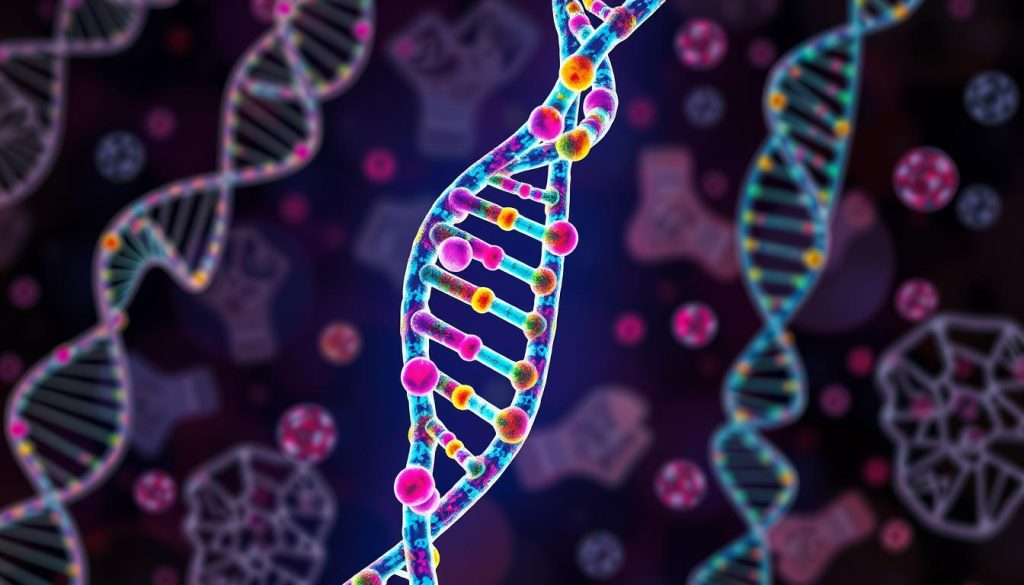
The Impact of Family History on Bone Marrow Health
Family history is a big clue for bone marrow health risks. Knowing your family’s medical history can show patterns linked to bone marrow cancer. Doctors use this info to suggest genetic tests or closer watch for those at risk.
| Condition | Genetic Mutation | Increased Risk Factor |
|---|---|---|
| Leukemia | FLT3 | High |
| Myeloma | BRCA1 | Moderate |
| Lymphoma | P53 | High |
Types of Bone Marrow Cancer
When we talk about abnormal bone marrow cancer, it’s crucial to know the different types. These cancers affect how blood cells are made and work. This leads to serious health problems. The main types are leukemia, lymphoma, and multiple myeloma, each with its own challenges.

Leukemia is a common bone marrow cancer. It makes too many bad white blood cells. This stops the bone marrow from making good blood cells. Lymphoma starts in the bone marrow but affects the lymphatic system. Multiple myeloma targets plasma cells, which help fight infections.
| Cancer Type | Key Characteristics | Common Treatments |
|---|---|---|
| Leukemia | Overproduction of abnormal white cells | Chemotherapy, targeted therapy |
| Lymphoma | Begins in bone marrow, spreads to lymph nodes | Radiation, immunotherapy |
| Multiple Myeloma | Abnormal plasma cell multiplication | Stem cell transplant, biopharmaceuticals |
Knowing about these abnormal bone marrow cancer types helps doctors and patients find the right treatments. This improves life quality and chances of recovery. Each cancer needs a specific treatment plan, showing the need for detailed knowledge and research in understanding abnormal bone marrow in cancer.
Bone Marrow Cancer Symptoms
It’s important to know the signs of bone marrow cancer early. This includes diseases like leukemia, multiple myeloma, and lymphoma. These diseases affect how the body makes blood cells. Spotting the early signs can lead to better treatment and outcomes.
Identifying Early Warning Signs
The first signs of bone marrow cancer can be hard to notice. They might look like other, less serious health problems. Look out for constant tiredness, frequent infections, and unexplained bruises or bleeding.
Weight loss and pain in the back or chest are also important signs. If you notice these, don’t ignore them. Seek medical help right away. Early stages might not always show clear signs of cancer, but they can be a warning.
When to Seek Medical Advice
If you notice any of these symptoms, see a doctor. They will do blood tests and a bone marrow biopsy to diagnose. Learning about bone cancer can also help. It’s important to know if these signs mean cancer or something else.
Here’s a quick look at symptoms of bone marrow cancer:
| Symptom | Description | Associated Cancer Type |
|---|---|---|
| Persistent Fatigue | Lack of energy or feeling unusually tired | Leukemia, Multiple Myeloma |
| Unexplained Weight Loss | Losing weight without changes in diet or exercise habits | Lymphoma |
| Bone Pain | Persistent or unusual pain, particularly in the back or chest | Multiple Myeloma |
| Easy Bruising or Bleeding | Experiencing bruises or bleeding without obvious causes | Leukemia |
| Frequent Infections | Needing treatment for infections more often than usual | Leukemia |
Knowing these symptoms and their link to abnormal bone marrow cancer is key. It helps you decide to see a doctor early. Staying informed and talking openly with your doctor is vital in dealing with bone marrow issues.
Non-Cancerous Conditions Affecting Bone Marrow
When we talk about abnormal bone marrow, we often think of cancer. But not all issues lead to cancer. There are many non-cancerous problems that can affect bone marrow, showing how complex these health challenges are.
Anemia and Its Relations with Bone Marrow Function
Anemia is a common problem that shows bone marrow might not be working right. It doesn’t mean you have cancer, but it could mean your bone marrow isn’t making enough healthy blood cells. If anemia is linked to bone marrow issues, it’s a sign of a possible bigger problem, like cancer.
Other Diseases Influencing Bone Marrow Performance
Other non-cancerous diseases like Vitamin B12 deficiency, iron deficiency, and autoimmune disorders can also affect bone marrow. These conditions show that symptoms similar to cancer can come from different causes. This highlights the need for thorough testing and accurate diagnosis.
With so many diseases affecting bone marrow, it’s key to tell the difference between benign and malignant causes. Doctors use detailed blood tests, biopsies, and look at individual risk factors to diagnose. Knowing about these issues helps in discussing bone marrow cancer treatment options and shows the value of personalized care.
Bone Marrow Cancer Treatment Options
The field of bone marrow cancer treatment options is always growing. New therapies are being developed to match the disease’s type and stage. Patients now have a variety of treatments to choose from, ranging from traditional methods to cutting-edge techniques.
It’s crucial to understand abnormal bone marrow in cancer to pick the best treatment. This knowledge helps tailor treatments to each patient’s unique genetic and medical needs.
- Chemotherapy: Uses strong drugs to kill fast-growing cancer cells.
- Radiation therapy: Kills cancer cells with high-energy rays.
- Stem cell transplant: Replaces bad bone marrow with healthy one from a donor.
- Targeted therapy: Attacks specific molecules to stop cancer growth.
- Immunotherapy: Boosts the immune system to fight cancer.
Each treatment has its own benefits and risks. These are weighed against the patient’s health and cancer type.
| Treatment Type | Common Uses | Considerations |
|---|---|---|
| Chemotherapy | Used for many bone marrow cancers | Can cause nausea, fatigue, and hair loss |
| Radiation Therapy | Helps prevent cancer spread | May cause skin changes and fatigue |
| Stem Cell Transplant | For cancers not helped by other treatments | Needs a good donor, risks infection |
| Targeted Therapy | Targets specific cancer mutations | Has fewer side effects than chemotherapy |
| Immunotherapy | For advanced or hard-to-treat cancers | Can cause immune reactions |
New discoveries in treating abnormal bone marrow in cancer are leading to better treatments. These advancements promise better results and a better life for patients.
Advances in Bone Marrow Research
The medical field is always looking for new ways to treat bone marrow diseases. Advances in bone marrow research have led to exciting bone marrow cancer treatment options. These breakthroughs bring hope and improve life and survival chances for those with bone marrow diseases.
Emerging Treatments and Therapies
New targeted therapies and personalized medicine are changing the game for bone marrow cancer. These treatments aim at the cancer’s genetic markers, making them more effective and less harmful. Immunotherapies that use the body’s immune system to fight cancer are also showing promise.
The Future of Bone Marrow Disease Management
The future of bone marrow research looks bright. It’s moving towards more precise and less invasive treatments. Gene editing, like CRISPR, might help fix genetic problems before they become diseases. Also, 3D bioprinting of bone marrow tissue could change how we treat and transplant.
Research and funding keep pushing the boundaries of bone marrow treatment. Each discovery brings doctors closer to offering personalized care. Patients get a second chance at life, making these advances key to modern medicine.
Conclusion
Understanding the link between bone marrow health and cancer is key. Not all bone marrow issues mean cancer. The question of does abnormal bone marrow mean cancer is complex. Many conditions, both good and bad, can affect bone marrow.
It’s crucial to note that a bone marrow cancer connection can stem from many factors. A detailed medical check is needed to understand these issues fully.
Exploring bone marrow health and genetic factors helps find the right diagnosis. This journey shows us the progress in treating bone marrow disorders. It brings hope to those dealing with these conditions.
New research offers a glimmer of hope for the future. It promises better ways to manage and understand bone marrow diseases.
As we wrap up, we share a message of hope and resilience. Our goal is to give you solid information and support. This is for those facing bone marrow challenges.
Having a caring support system and expert advice is vital. We’re here to educate and support you. Our dedication to helping you is unwavering.
FAQ
Q: What is Bone Marrow and What Function Does It Serve?
A: Bone marrow is a soft tissue inside bones. It makes blood cells like red and white blood cells, and platelets. It’s key to our immune system and health.
Q: Can Abnormal Bone Marrow Indicate Conditions Other Than Cancer?
A: Yes, it can. Abnormal bone marrow can also mean anemia, infections, or autoimmune diseases. It can also show up due to vitamin or mineral deficiencies.
Q: What Are the Common Causes of Abnormal Bone Marrow?
A: Many things can cause abnormal bone marrow. This includes iron deficiency and severe diseases like leukemia. Lifestyle, genetics, and exposure to harmful substances can also play a role.
Q: How Do Doctors Evaluate Bone Marrow Health?
A: Doctors check bone marrow health with blood tests. They look at blood cell counts. If needed, they might do a bone marrow biopsy to see cells under a microscope.
Q: Does the Presence of Genetic Mutations Always Lead to Bone Marrow Disorders?
A: No, not always. Genetic mutations can raise the risk of bone marrow disorders. But, they don’t mean you’ll definitely get them. Family history and tests can help figure out risks.
Q: What Are the Different Types of Bone Marrow Cancer?
A: Main types include leukemia, lymphoma, and multiple myeloma. Each affects the marrow differently. Symptoms and outcomes vary by type.
Q: What Symptoms Might Suggest the Presence of Bone Marrow Cancer?
A: Symptoms can be fatigue, frequent infections, and easy bruising. Bone pain, unexplained weight loss, and fever are also signs. See a doctor if you have these symptoms.
Q: Are There Non-Cancerous Bone Marrow Disorders?
A: Yes, there are. Conditions like anemia and thrombocytopenia can affect bone marrow. These are not cancers.
Q: What Treatment Options Are Available for Bone Marrow Cancer?
A: Treatments include chemotherapy, radiation, and targeted therapy. Sometimes, stem cell transplantation is used. The right treatment depends on the cancer type and the patient’s health.
Q: How Have Advances in Bone Marrow Research Affected Treatment?
A: New research has led to better treatments. Immunotherapy and personalized medicine are now options. These offer more effective treatments for bone marrow disorders.














